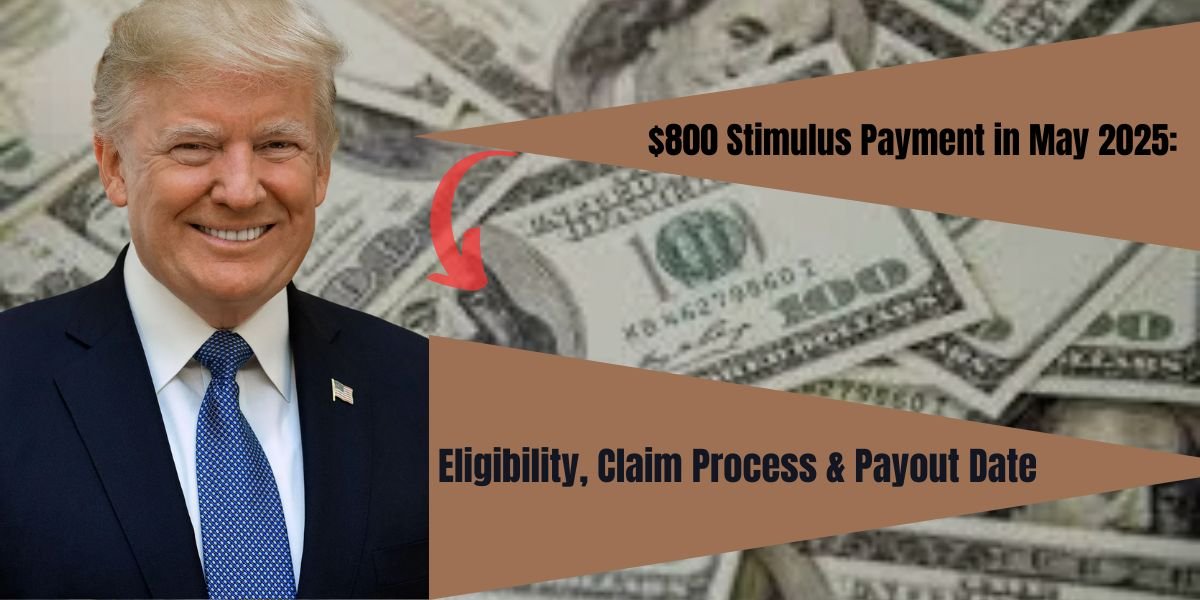With increasing expenses and financial insecurity still impacting millions, the rumor about a possible $800 stimulus check in May 2025 is gathering pace. Though no decision is yet taken, legislators are ongoing with discussions regarding more relief. If you’re considering if you might qualify and what to do next, this guide contains all you need to know in simple terms.
Overview
Here’s a preview of what the $800 stimulus check could contain:
| Key Points | Details |
|---|---|
| Payment Amount | $800 per eligible individual (pending approval) |
| Eligibility Criteria | Based on income, tax filing status, dependents, and residency |
| Payment Date | Expected May 2025 if approved |
| How to Claim | Automatically via IRS or by filing a tax return |
| IRS Resource Page | www.irs.gov |
Even though the program is still pending legislation, getting ready now can ensure that you get your payment easily if it goes through.
$800 Stimulus Check
This stimulus check being suggested is a continuation of efforts to assist Americans who are being hit with increasing inflation, stagnant wages, and the lingering impacts of the COVID-19 pandemic. Similar to past stimulus checks, the $800 payment would be directed towards lower- and middle-class earners and intended to stimulate consumer spending and economic growth.
Stimulus checks have traditionally been utilized as a means to inject money into the economy, assist families in paying necessities, and alleviate short-term financial pressures.
Why the Check Is Being Considered
Following are some of the reasons Congress will likely authorize a fourth round of payments:
Inflation Pressures
Although inflation has eased since its 2022 peak, prices for necessities such as food, gasoline, and utilities are still elevated.
Wage Stagnation
Most workers have not experienced wage growth that keeps up with increasing costs, making daily expenses harder.
Ongoing Recovery
Some people and businesses are continuing to recover from the pandemic. A stimulus check would help fill that gap and assist both families and small businesses.
Who Might Qualify
While specific eligibility criteria haven’t been determined, they will probably mirror the standards applied in earlier rounds of stimulus.
Income Limits
Eligibility generally depends on adjusted gross income (AGI). These are the typical cutoffs:
| Filing Status | Full Payment If AGI Is Under |
|---|---|
| Single | $75,000 |
| Married Filing Jointly | $150,000 |
| Head of Household | $112,500 |
If you earn more than these levels, your payment could be cut back or eliminated entirely.
Tax Filing Status
Your filing status—single, married filing jointly, head of household, or qualifying widow(er)—may impact how much you get.
Dependents
Past programs included extra money for each qualifying dependent under age 17. If this method is reinstated, families might qualify for extra dollars.
Other Requirements
You need to be a U.S. citizen, resident alien, or have lawful residency. Non-filers and individuals on benefits such as Social Security or VA can also be eligible if they qualify based on income and documentation.
When the Payment Might Arrive
If approved, the $800 stimulus check may be sent out as early as May 2025. Depending on how past payments were done, here’s what to look out for:
Payment Methods
- Direct Deposit: Quickest way if the IRS knows your banking information
- Paper Checks: Sent to your home address if direct deposit isn’t established
- Prepaid Debit Cards: Utilized in certain instances for those who don’t have bank accounts
Keep your info with the IRS up to date to prevent delays.
Potential Delays
Unexpected problems—such as legislative slowdowns or system crashes—can affect timing. Get current by visiting irs.gov or subscribing to alerts.
How to Claim
In general, you won’t have to do anything out of the ordinary to get the payment. But here are some steps you can take to be sure:
File Your Taxes
The IRS will use your latest tax return to figure out whether you qualify. If you didn’t file a return for 2023 or 2024, be sure to file even if you don’t owe taxes.
Update Direct Deposit Information
If your bank information has changed, be sure to update that with the IRS. You can do this when you file your tax return or log into your account on the IRS website.
For Non-Filers
If you don’t need to file your taxes, you might still be able to. Previously, the IRS had a Non-Filer Tool to let individuals provide simple information. You might see that tool again if the stimulus comes back.
Support Small Businesses
Stimulus payments not only aid people but small businesses as well.
- Freelancers and Gig Economy Workers: May use the check to fund necessary expenses or reinvest into the business
- Local Businesses: When consumers use the stimulus to buy things, nearby stores and services see higher demand
It’s a chain effect—money in consumers’ pockets translates into activity in the local economy.
Intelligent Things to Do With the $800 Check
Whether you’re catching up or planning ahead, here are a few tips on using your stimulus wisely:
- Pay Down Debt: Focus on high-interest loans like credit cards
- Start or Add to Emergency Savings: Having a cushion for unexpected costs can offer peace of mind
- Invest in the Future: Use part of the money for education, job tools, or retirement
Regardless of how small it may look, this will go a long way with wise planning.
Is the $800 stimulus approved yet?
No, it’s still under consideration in Congress.
Who qualifies for the $800 check?
Probably those making less than $75K (single) or $150K (joint).
When will the payment be sent?
If it passes, it might start deploying in May 2025.
Do I need to apply for the check?
Most individuals won’t have to apply—it’ll be automatic.
Can non-filers get the stimulus?
Yes, but they might need to use an IRS tool to provide information.
